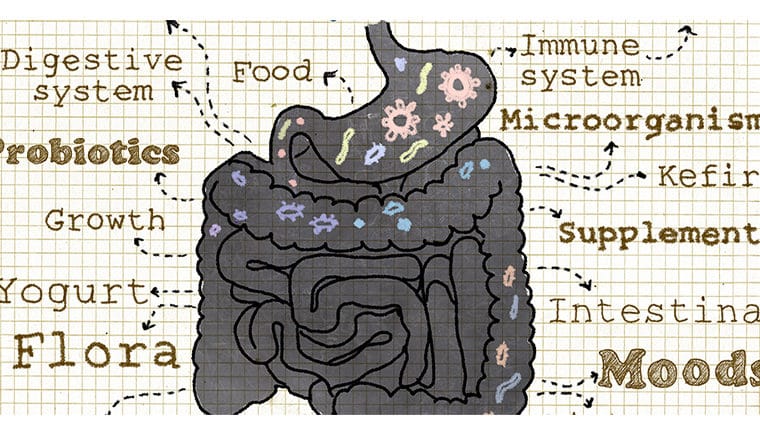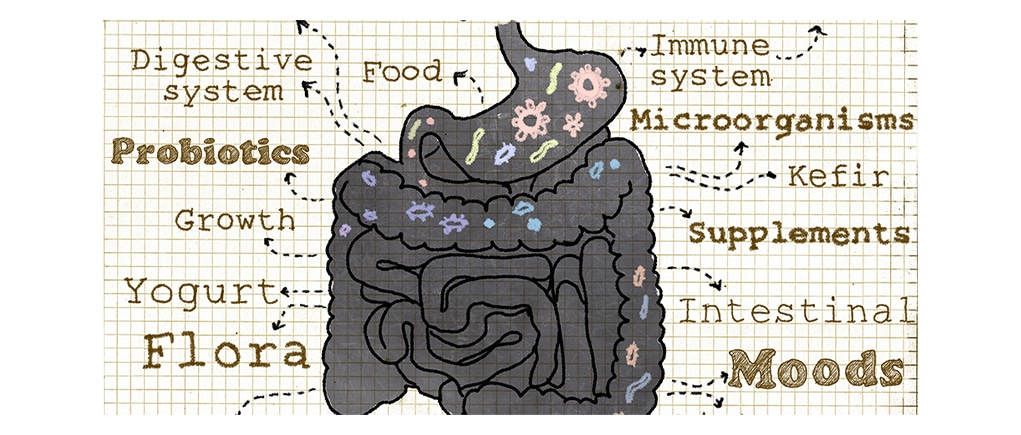



Have you wondered if there was a connection between autism, gut health, and probiotics? If you have, then you were right.
Research on autism, gut health, and probiotics is a new and emerging area. While scientists haven’t been able to draw firm conclusions yet, keep reading to learn about what is currently known on this fascinating topic.
Let’s begin by defining Autism and neurodivergence.
Autism is a neurological condition characterized by difficulty with social interaction and communication, narrow interests, and repetitive behaviors (such as specific movements or noises). Autism exists on a spectrum which means it impacts everyone differently. Autistic people may also be sensitive to textures (such as food textures), sight, touch, and sounds.
There has been a shift away from seeing autistic brains as a “problem” to celebrating their neurodivergence, which means autistic brains learn and process the world differently and uniquely.
Neurodiversity embraces the idea that everyone’s brains are different and there is no “right” or “wrong” way for our brains to process information.
Autistic people have higher rates of digestive issues than people without autism or neurotypical people.3 In fact, about 23% – 70% of those with autism have some kind of digestive concerns, most commonly being constipation, diarrhea, bloating, gas, or abdominal pain. Stomach flu, food allergies, gastric reflux, and inflammatory bowel disease (IBD) are more common in autistic individuals as well.
Digestive issues may contribute to worsened behavior in autistic children. It makes sense: if you’re having tummy troubles, you likely won’t be in a good mood or behave like your usual self.
There seems to be an interesting relationship between autism severity and gut health, where more severe autism symptoms are associated with increased digestive issues. Note that this does not mean that one causes the other but simply that there seems to be a connection between the two.
There are several possible explanations as to why autistic people have more digestive concerns than the general population. One reason could be a lack of variety in diet. Autistic kids can be picky eaters due to a heightened sensitivity to food textures. In fact, they are five times more likely to have feeding challenges compared to neurotypical children.
As a result, they may eat a small number of foods, which tend to be more processed, and their diets tend to be lower in high-fiber foods. High-fiber foods such as vegetables, fruits, whole grains, beans, and legumes, contribute to a more diverse, balanced amount of gut bacteria so when one’s diet is low in these foods, it can negatively impact their gut health.
Other possible contributors to digestive issues in autism include genetics, environmental factors, certain medications, or holding in stool out of fear of using the toilet.
The gut microbiome comprises trillions of bacteria (also called microbes) that live inside our digestive tracts (mostly the small and large intestines). We each have thousands of different types of bacteria inside our guts that play many roles in keeping us healthy or making us sick.
Most of the microbes in our gut live together peacefully, but when there is an imbalance in the types of microbes, which could happen from certain foods, infections, or long-term use of antibiotics, it could increase one’s risk for illnesses or digestive issues. More than half of the digestive symptoms in autism may be due to this probiotic bacterial imbalance.
Comparing the types of gut bacteria in autistic children vs neurotypical children is fascinating. A large study found that autistic children had lower amounts of beneficial bacteria and higher amounts of bad bacteria in their digestive tracts when compared to typically-developing children.
Researchers found that autistic kids had lower levels of a beneficial bacteria called Bifidobacterium which plays a role in reducing gut inflammation, supporting the immune system, and preventing organisms from turning into disease (such as E. coli).
In this study, autistic children also had higher levels of a bad bacteria called Faecalibacterium which can negatively impact one’s immune system.3 This imbalance of good and bad gut bacteria may explain the increase in digestive issues in this population.
You may have heard the buzzword “gut-brain axis” but may not know what it means. The gut-brain axis is the communication system between your gut and brain. They communicate with each other in both directions, meaning the brain sends signals to the gut and vice versa. Many factors, such as stress, can disrupt this communication pathway.
Gut bacteria also play a role in influencing the gut-brain axis and having an imbalanced microbiome, which is common in autism, can negatively impact the digestive tract, behavior and the brain.
An example of how this relationship can play out is if an autistic person has stomach pain and bloating from constipation but can’t verbally communicate how they are feeling, their behaviors may worsen from their discomfort. The person may groan, be more irritable, anxious, or self-injure themselves as a way to try to express their discomfort. The gut-brain axis and autism is a complicated topic that is still in its early stages of research.*
A number of small but promising studies have shown an improvement in digestive concerns and behavior in autistic children given a probiotic supplement. For example, at the end of one study where autistic kids and teens between the ages of 4 and 16 were given a specific probiotic supplement, the participants had increased levels of good gut bacteria and lower levels of bad bacteria.4 Participants’ stool consistency and behaviors improved but bloating, gas, and stomach pain didn’t change.
Other studies where children with autism were given a probiotic supplement for 3 to 4 months showed an increase in beneficial gut bacteria as well as improvement in digestive symptoms and behavior.
What does this mean for you? While current research results are promising, we’re still in the early stages. We don’t yet know what type of probiotic supplement is most beneficial in autism and how long the person should be taking it. We also can’t say that probiotics will definitely improve gut symptoms in every autistic person because everyone responds differently.
What we can say is that unless someone is immunocompromised, there is likely no harm in consuming a variety of probiotic-rich foods or a supplement to improve one’s gut microbiome. Always consult with a qualified healthcare provider to find out what’s best for you, especially before starting a new supplement.
The connection between gut health, probiotics, and autism is super interesting and multi-faceted. While there is still a lot we don’t yet know, probiotic supplements and foods have the potential to improve autistic children’s gut bacteria balance.
*At this time it is unclear whether gut issues in autistic individuals contribute to behavioral symptoms as further research is needed to get more answers.

Jackie Silver is a Registered Dietitian who runs the blog Jackie Silver Nutrition which provides healthy recipes and educational nutrition information tailored to the autism, ADHD, and disability communities. She also runs a virtual private practice that focuses on autistic kids, teens, and adults. Jackie is passionate about bringing much-needed reliable nutrition information to these underserved populations.